Module 4 Home alone 模块导学课件
文档属性
| 名称 | Module 4 Home alone 模块导学课件 | 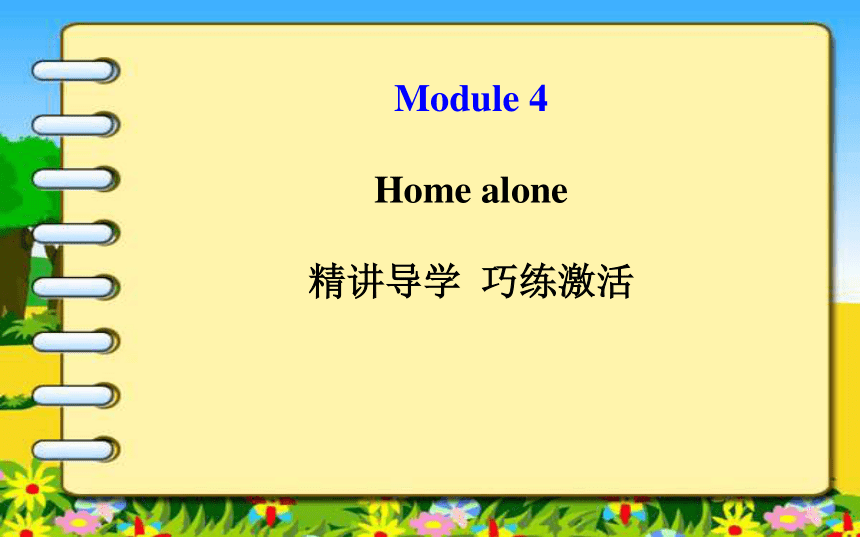 | |
| 格式 | zip | ||
| 文件大小 | 2.8MB | ||
| 资源类型 | 教案 | ||
| 版本资源 | 外研版 | ||
| 科目 | 英语 | ||
| 更新时间 | 2014-11-19 18:46:48 | ||
图片预览

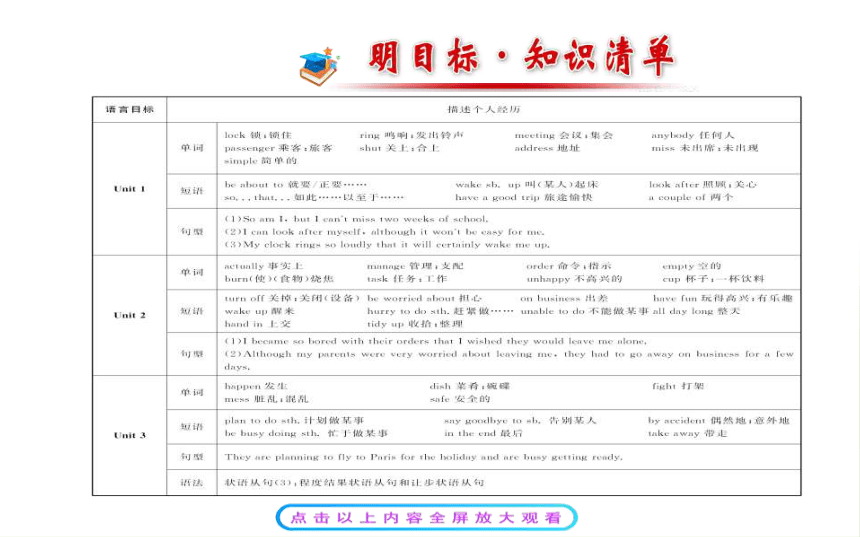
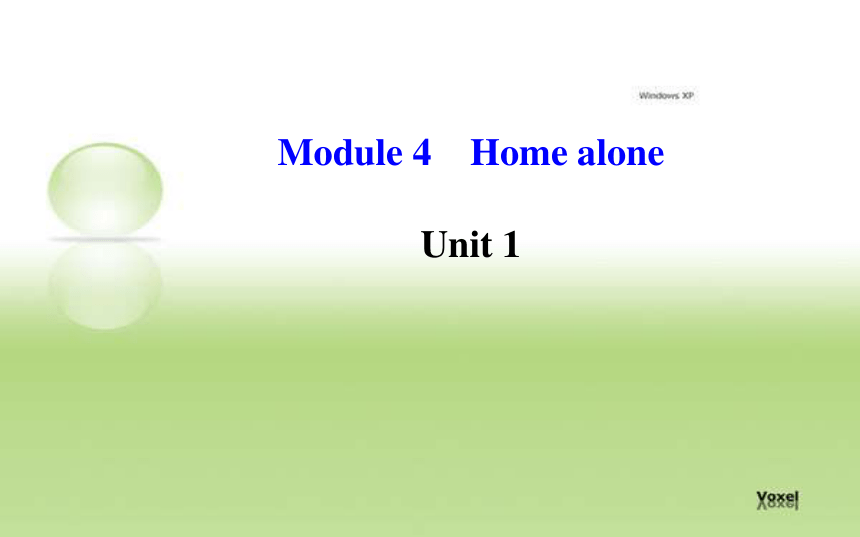
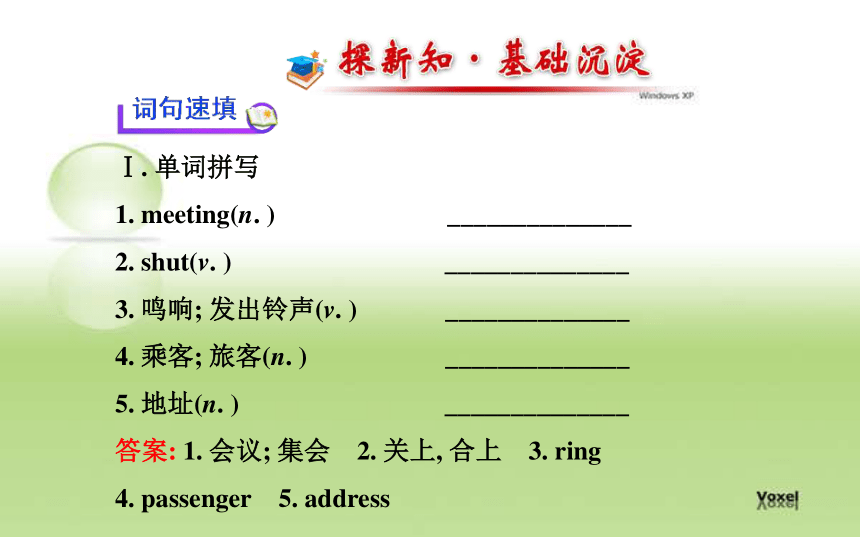
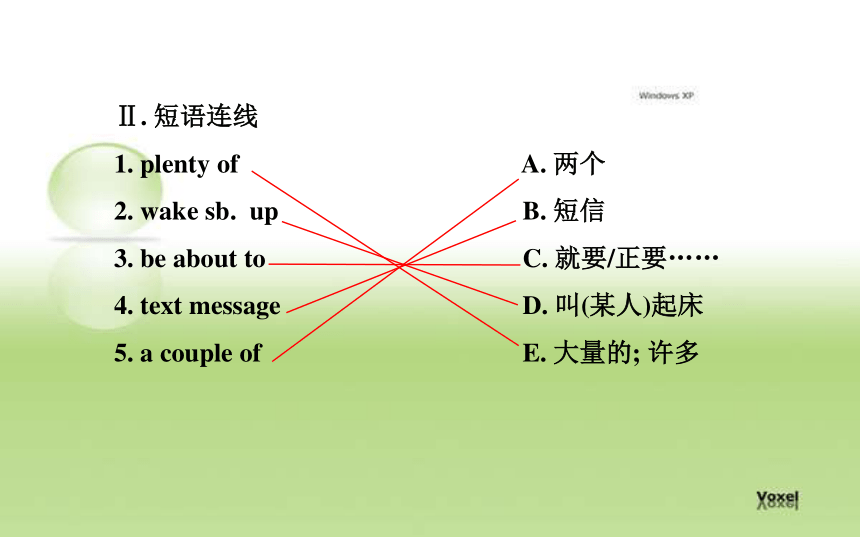
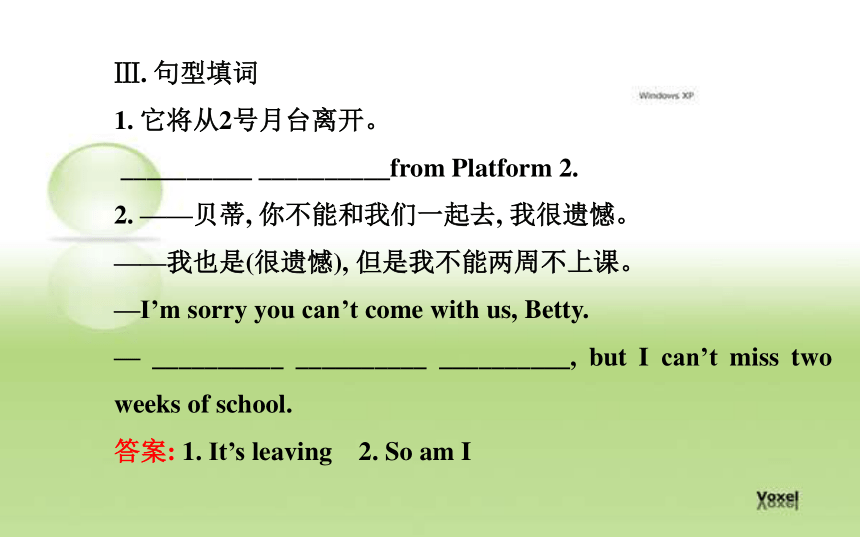
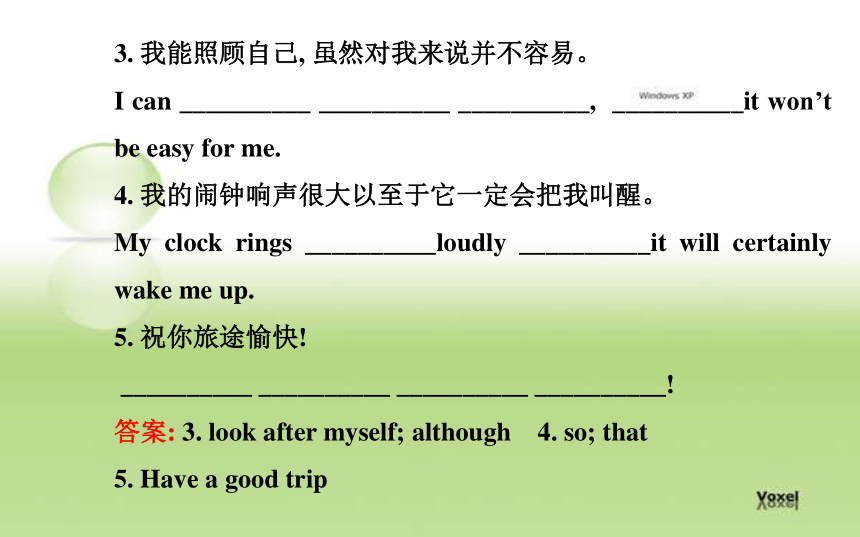
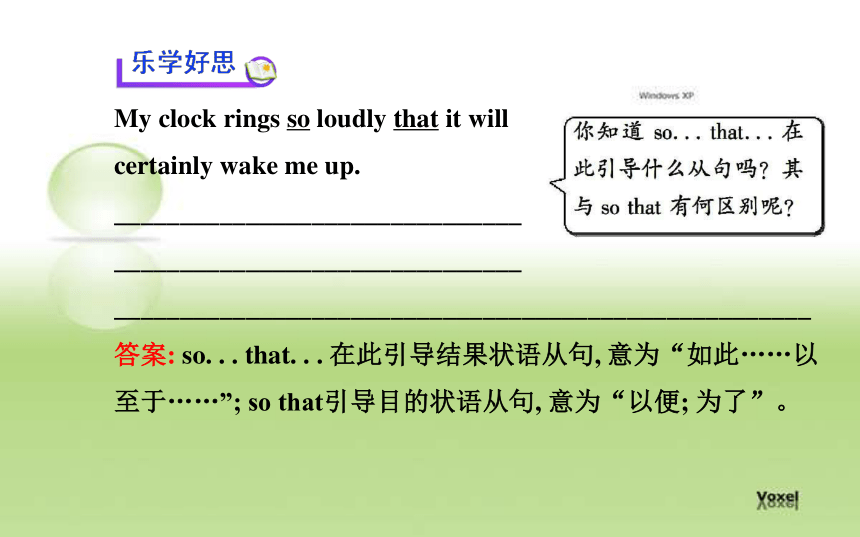
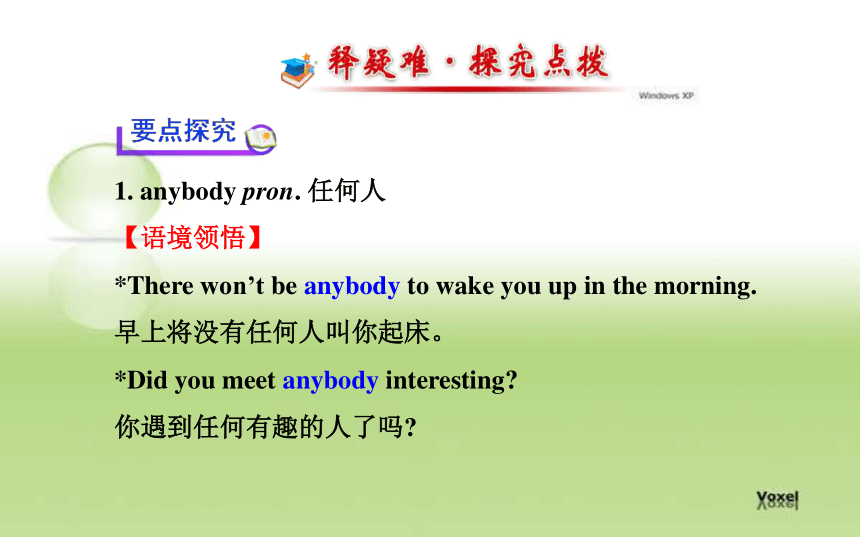
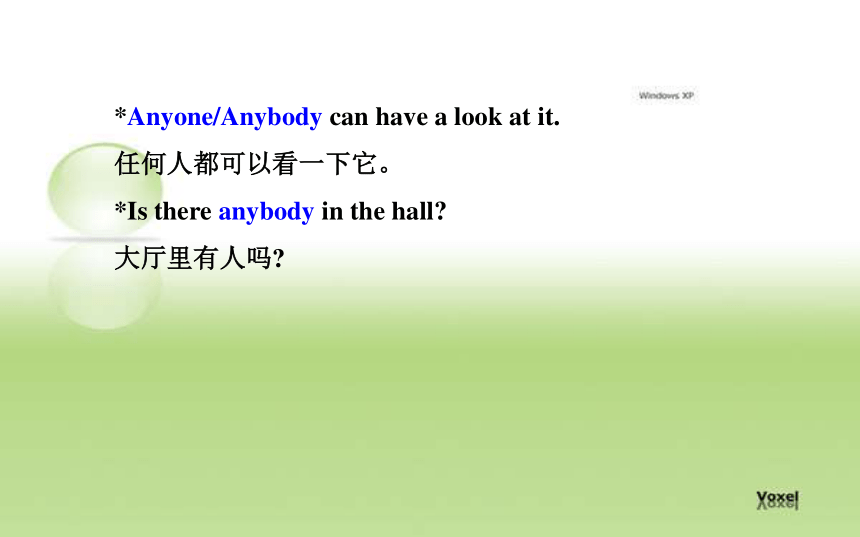
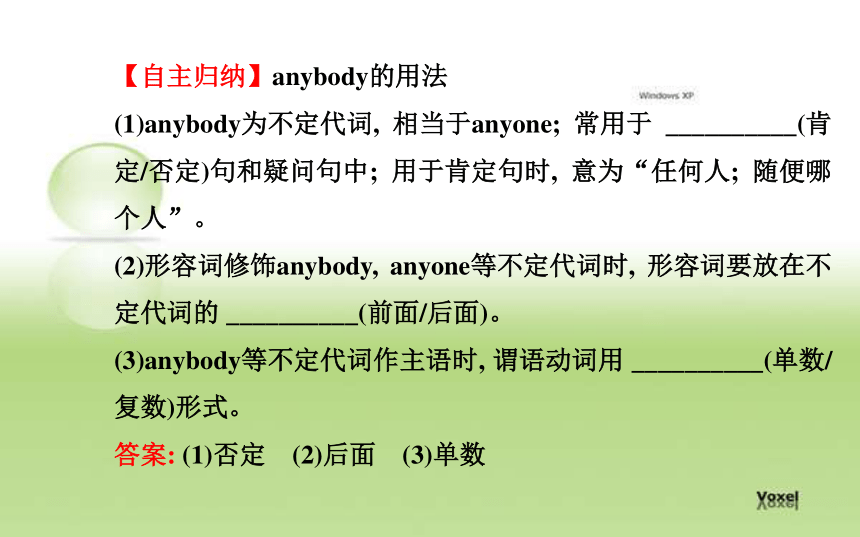
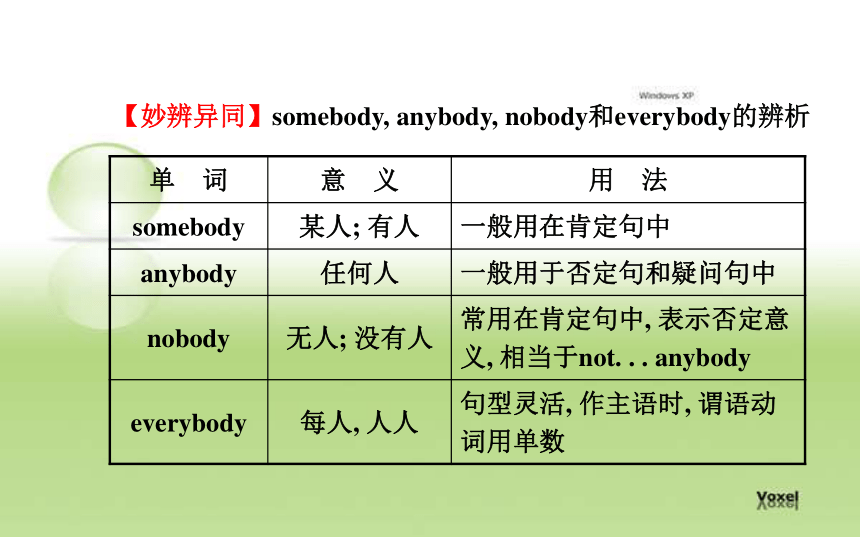
文档简介
课件102张PPT。Module 4
Home alone
精讲导学 巧练激活
Module 4 Home alone
Unit 1 Ⅰ. 单词拼写
1. meeting(n. ) ______________
2. shut(v. ) ______________
3. 鸣响; 发出铃声(v. ) ______________
4. 乘客; 旅客(n. ) ______________
5. 地址(n. ) ______________
答案: 1. 会议; 集会 2. 关上, 合上 3. ring
4. passenger 5. addressⅡ. 短语连线
1. plenty of A. 两个
2. wake sb. up B. 短信
3. be about to C. 就要/正要……
4. text message D. 叫(某人)起床
5. a couple of E. 大量的; 许多Ⅲ. 句型填词
1. 它将从2号月台离开。
__________ __________from Platform 2.
2. ——贝蒂, 你不能和我们一起去, 我很遗憾。
——我也是(很遗憾), 但是我不能两周不上课。
—I’m sorry you can’t come with us, Betty.
— __________ __________ __________, but I can’t miss two weeks of school.
答案: 1. It’s leaving 2. So am I3. 我能照顾自己, 虽然对我来说并不容易。
I can __________ __________ __________, __________it won’t be easy for me.
4. 我的闹钟响声很大以至于它一定会把我叫醒。
My clock rings __________loudly __________it will certainly wake me up.
5. 祝你旅途愉快!
__________ __________ __________ __________!
答案: 3. look after myself; although 4. so; that
5. Have a good tripMy clock rings so loudly that it will
certainly wake me up.
_______________________________
_______________________________
_____________________________________________________
答案: so. . . that. . . 在此引导结果状语从句, 意为“如此……以至于……”; so that引导目的状语从句, 意为“以便; 为了”。1. anybody pron. 任何人
【语境领悟】
*There won’t be anybody to wake you up in the morning.
早上将没有任何人叫你起床。
*Did you meet anybody interesting?
你遇到任何有趣的人了吗? *Anyone/Anybody can have a look at it.
任何人都可以看一下它。
*Is there anybody in the hall?
大厅里有人吗? 【自主归纳】anybody的用法
(1)anybody为不定代词, 相当于anyone; 常用于 __________(肯定/否定)句和疑问句中; 用于肯定句时, 意为“任何人; 随便哪个人”。
(2)形容词修饰anybody, anyone等不定代词时, 形容词要放在不定代词的 __________(前面/后面)。
(3)anybody等不定代词作主语时, 谓语动词用 __________(单数/复数)形式。
答案: (1)否定 (2)后面 (3)单数【妙辨异同】somebody, anybody, nobody和everybody的辨析【学以致用】
①(2013·东营中考)“I don’t think I am different from __________ else. I am just the son of a farmer, ”Mo Yan said.
A. anyone B. nobody
C. someone D. everyone②(2013·德州中考)—Who helped Betty tidy up the bedroom just now?
— __________. She cleaned it all by herself.
A. Somebody B. Nobody
C. Everybody D. Anybody2. —I’m sorry you can’t come with us, Betty.
—So am I, but I can’t miss two weeks of school.
——贝蒂, 你不能和我们一起去, 我很遗憾。
——我也是(很遗憾), 但是我不能两周不上课。【句型剖析】【温馨提示】
表示与上文所述否定情况相同时, 应该用句型“Neither+ be/助动词/情态动词+主语”结构。例如: Mary isn’t outgoing, neither am I. 玛丽不外向, 我也不(外向)。【学以致用】
(2013·铜仁中考)—I really hate to go to such a noisy place.
—______.
A. So am I B. So do I
C. So have I D. So can I3. My clock rings so loudly that it will certainly wake me up.
我的闹钟响声很大, 以至于它一定会把我叫醒。
【句型剖析】
so. . . that. . . 意为“如此……以至于……”, 引导结果状语从句。句中的so是副词, 常用来修饰形容词或副词。即: so+形容词/副词+that从句。【归纳拓展】so. . . that的不同句式
(1)so+形容词+a/an+可数名词单数+that从句。例如: Bill is so cute a boy that we all like him. 贝尔是如此可爱的一个男孩, 我们都喜欢他。
(2)so+many/few/much/little+名词+that从句。例如: The explorer had so many falls that he was black and blue all over. 探险家摔了很多跤, 以至于全身上下青一块, 紫一块的。【温馨提示】so. . . that句式中, 当that引导的结果状语从句为肯定句时, 可以与be . . . enough to do转换; 当从句为否定句时, 可以与too . . . to . . . 或be not . . . enough to do转换。【学以致用】
(2013·遂宁中考)He was __________tired __________he could not go on walking.
A. too; to B. such; that C. so; that【授课备选】补充练习
Jim is so young that he can’t look after himself. (改为同义句)
①Jim is __________young __________look after himself.
②Jim is __________ old __________ __________ look after himself.
答案: ①too; to ②not; enough to【备选要点】
be about to就要/正要……
【语境领悟】
*Your train is about to leave.
你的火车要开了。
*I was about to go out when the rain started.
我刚要出门, 这时下起雨来。【自主归纳】be about to的用法
(1)be about to do sth. 意为: 就要/正要做某事, 指马上就要进行的动作, 意义相当于be going to do sth. , 但不与表示将来的时间状语连用。
(2)be about to与when引导的时间状语从句连用, 表示正打算做什么事情时突然发生了由when引导的从句表示的事情。【学以致用】
Mr. Black doesn’t like working in the factory, so he is about __________(find)another job.
答案: to findⅠ. 用所给词的适当形式填空
1. The basketball team is __________(leave)Beijing for London tomorrow.
2. The manager is at a __________(meet). Please wait for a moment.
3. His parents died when he was 10 years old, so he had to look after __________(him).
答案: 1. leaving 2. meeting 3. himself4. There isn’t __________(somebody)in the dining hall.
5. The minister advised him __________(leave)as soon as possible.
答案: 4. anybody 5. to leaveⅡ. 完成句子
1. 露西非常刻苦, 我也这样。
Lucy is hard-working, __________ __________I.
2. 我习惯周末睡懒觉, 但是我妈妈总是很早就把我叫起来。
I am used to getting up late at weekends, but my mother always __________ __________ __________very early.
3. 不要着急! 公交车马上就到。
Take it easy! The bus is __________ __________arrive.
答案: 1. so am 2. wakes me up 3. about to4. 游客们将在广州待上两周。
The tourists will stay in Guangzhou for __________ __________ __________weeks.
5. (2013·黄石中考)这道题太难了, 我们都做不出来。
It was __________difficult a problem __________none of us worked it out.
答案: 4. a couple of 5. so; thatModule 4 Home alone
Unit 2 Ⅰ. 单词拼写
1. order(n. ) ________________
2. actually(adv. ) ________________
3. 管理; 支配(v. ) ________________
4. (使)烤糊(v. ) ________________
答案: 1. 命令; 指示 2. 事实上 3. manage 4. burn 5. 空的(adj. ) ________________
6. 任务; 工作(n. ) ________________
7. happy(adj. )→ __________(反义词)不高兴的
答案: 5. empty 6. task 7. unhappyⅡ. 短语连线
1. 关掉; 关闭 A. be worried about
2. 担忧…… B. hand in
3. 出差 C. on business
4. 上交 D. turn off
5. 收拾; 整理 E. tidy upⅢ. 句型填词
1. 虽然他们爱我, 我仍然对他们有点不高兴。
__________they loved me, I felt a bit unhappy with them.
2. 我变得对他们的命令如此厌烦, 以至于我希望他们让我一个人待着。
I became __________bored with their orders __________I wished they would __________ __________ __________.
答案: 1. Although 2. so; that; leave me alone3. 第一天我一放学回家就开心地把书包扔在沙发上, 吃了很多的零食。
__________ __________ __________I got home from school the first day, I happily threw my schoolbag on the sofa and ate lots of snacks.
4. 老师问我要作业, 但是我无法上交。
The teacher __________ me __________my homework, __________ I could not hand it in.
答案: 3. As soon as 4. asked; for; but5. 我意识到自己独自在家并不一直是完美的。
I realised __________home alone __________not always perfect.
答案: being; was1. Why did Zheng Chenyu feel
unhappy with his parents?
__________________________________________________________________________________________________________________________________________________________________
答案: Because they did everything for him and they managed every minute of his life. 2. What were Zheng Chenyu’s parents happy to find when they came home?
__________________________________________________________________________________________________________________________________________________________________
答案: They were happy to find that he could cook and tidy up when they came home. 1. order n. 命令; 指示
【语境领悟】
*I became so bored with their orders that I wished they would leave me alone.
我变得对他们的命令如此厌烦, 以至于我希望他们让我一个人待着。*May I take your order, please?
我能为您点菜吗?
*The boss ordered him to finish the report in half an hour. 老板命令他半个小时完成报告。【自主归纳】order的用法
(1)order作名词时, 表示“命令, 指示”, 为可数名词; 还可意为“订单, 顺序”。常用短语为: take one’s order为某人点菜, in order按顺序。
(2)order作动词时, 表示“命令, 订购”。常用短语为: order sb. to do sth. “命令某人做某事”。【温馨提示】
“in order to +动词原形”或“in order that +从句”, 表示“为了; 以便于”。【学以致用】
①军人必须服从命令。
Soldiers must obey __________.
②The police ordered the robber __________(raise)his hands and stand against the wall.
答案: ①orders ②to raise2. business n. 工作
【语境领悟】
*Although my parents were very worried about leaving me, they had to go away on business.
虽然我的父母非常担心离开我, 但他们不得不去出差。
*How is your business? 你的生意怎么样?
*She started a new business in Phoenix not long ago.
不久前她在凤凰城新开了一家公司。
*It’s none of your business. 这不关你的事。【自主归纳】
(1)business名词, 意为“商业; 事务; 工作”时常作不可数名词。当表示“商行; 商店”时作可数名词。
(2)常用短语为on business, 意为“出差”; in business意为“在经营; 在营业中”。例如: He’s in business on a small scale. 他做的是小本生意。【温馨提示】
businessman/businesswoman意为“商人/女商人”, 是由business后接man/woman构成的可数名词, 其复数形式分别为businessmen/businesswomen。【学以致用】
Mr. Smith is going to take a trip __________ __________(出差)tomorrow.
答案: on business3. turn off 关掉; 关闭(设备)
【语境领悟】
*Turn off the TV! 关掉电视!
*Your radio is too noisy. Turn it off, please.
你的收音机太吵了, 请关上它。【自主归纳】turn off的用法
(1)turn off动词短语, 意为“关掉; 关闭(设备)”, 常指“关掉(某种电器); 切断电源等”。
(2)turn off是由“动词turn+副词off”构成的短语, 名词作宾语, 置于其后或中间; 代词作宾语, 置于中间。【归纳拓展】 turn的常用短语 【学以致用】
①(2013·广州中考)离开教室时请关灯。
Please __________ __________the lights when you leave the classroom.
②(2013·嘉兴舟山中考)It’s time for CCTV news. Let’s __________ the TV and watch it.
A. turn on B. get on
C. try on D. put on
答案: turn off 【备选要点】
tidy up收拾; 整理
【语境领悟】
*When my parents came home, they were happy to find that I could cook and tidy up now.
当我父母回到家的时候, 他们很高兴地发现我现在会做饭和整理家务了。
*Mary cleans up her room every day.
玛丽每天打扫干净她的房间。【自主归纳】【学以致用】
①你的房间那么乱, 收拾一下吧。
Your room is in a mess, please __________it __________.
②The classroom is so clean. Who ______it ______this morning?
A. turned; up B. cleaned; up
C. gave; up D. put; up
答案: tidy; upⅠ. 用所给词的适当形式填空
1. The old lady is unable __________(walk)by herself.
2. More and more students become __________(bore)with their homework.
3. The little girl tried to cook noodles but she __________ (burn) it at last.
答案: 1. to walk 2. bored 3. burned/burnt4. The director gave __________(order)that the work should be started immediately.
5. —I’m __________(worry)about tomorrow’s math exam.
—Take it easy. I’m sure you’ll make it.
答案: 4. orders 5. worriedⅡ. 完成句子
1. 露西的妈妈安排了她生活中的每一分钟。
Lucy’s mother __________ __________ __________of her life.
2. (2013·湛江中考)别担心! 我已经关灯了。
Don’t worry! I have __________ __________the lights.
3. 我飞往东京出差。
I flew to Tokyo __________ __________.
答案: 1. managed every minute 2. turned off
3. on business4. 我太累了, 以致我一吃完晚饭就去睡觉了。
I was __________tired __________I went to bed as soon as I ate the supper.
5. 在我们搬进去之前应该先把那地方收拾一下。
We should __________ __________the place before we move in.
答案: 4. so; that 5. tidy upModule 4 Home alone
Unit 3 【备选要点】
1. by accident偶然地; 意外地
【语境领悟】
*They are all in a hurry to get to the airport, so they forget Kevin and he is left alone at home by accident.
他们都匆忙赶去机场, 所以他们忘了凯文, 他被意外地独自留在了家里。【自主归纳】
(1)by accident为介词短语, 意为“偶然地; 意外地”, 常放在句末, 用来修饰前面的动词。
(2)其同义短语为by chance。例如: The traffic accident happened by chance.
这起交通意外是偶然发生的。【学以致用】
①(2013·兰州中考)那个小孩在登山中意外地摔伤了腿。
That child broke his leg __________ __________when he was climbing the mountain.
②As we all know, tea was invented by chance. (改为同义句)
As we all know, tea was invented __________ __________.
答案: ①by accident/chance ②by accident2. be busy doing sth. 忙于做某事
【语境领悟】
*They are planning to fly to Paris for the holiday and are busy getting ready.
他们计划坐飞机到巴黎度假, 正忙于做准备。
*My sister is busy with her homework.
我妹妹正忙于她的家庭作业。【自主归纳】
be busy意为“忙于……”, 后面可接名词或动名词构成宾语, 即常用结构为:
(1)be busy doing sth. “忙于做某事”;
(2)be busy with sth. “忙于某事”。【学以致用】
(2013·黄石中考)Don’t disturb him. He is busy w __________an important report.
答案: writingⅠ. 单项选择
1. ______my teacher had a cold, ______he kept on working hard.
A. Although; but B. But; although
C. /; although D. Although; /
2. I planned ______ the Summer Palace, but we couldn’t go there because of the heavy rain.
A. visited B. visiting C. to visit D. visits3. My parents will be on business, so they will be not __________ for three days.
A. on B. in C. around D. at
4. (2013·青岛中考)I don’t have a present for my friend. What if ______ else brings a present?
A. anybody B. nobody
C. everyone D. none5. (2013·莱芜中考)A smile costs______, but gives so much.
A. something B. anything
C. nothing D. everythingⅡ. 完成句子
1. 中国的孩子过分依赖父母。
The Chinese children __________ __________their parents too much.
2. 我不能去看电影, 因为我必须照顾我的小妹妹。
I can’t go to the movies because I have to __________ __________ my little sister.
答案: 1. depend on 2. look after 3. (2013·益阳中考)汤姆这个下午将在机场为他的朋友送行。
Tom will __________his friend __________this afternoon in the airport.
4. 妈妈忙于做饭, 没法接电话。
My mother was __________ __________, so she couldn’t answer the phone.
5. 苹果碰巧掉在博比的头上。
The apple fell on Bobby’s head __________ __________.
答案: 3. see; off 4. busy cooking 5. by accident状语从句(3): 程度结果状语从句和让步状语从句
【语境领悟】仔细观察例句并体会句式结构。
①The whole meeting room was in silence, although there were nearly one thousand people in it.
②Though Tracy is hard-working, she still gets bad grades.
③My English teacher is so friendly and funny that we all like him.
④This is such an interesting story that many students like it. 【知识构建】【归纳拓展】so. . . that. . . 的转换结构
(1)当主句与从句一致, 且从句为肯定句时, so . . . that. . . 可以与. . . enough to结构相互转换。
(2)当程度结果状语从句表达否定意义时, 可与too. . . to. . . 结构相互转换。【妙辨异同】so. . . that. . . 与such. . . that. . . 的用法区别
①so. . . that. . . 常用结构:
②such. . . that. . . 常用结构: +adj./adv.
+adj.+a/an+可数名词单数
+many或few+可数名词复数
+much或little+不可数名词+a/an+adj.+可数名词单数
+adj.+可数名词复数/不可数名词sosuch+that...+that...【学以致用】
Ⅰ. 单项选择
1. ______the traffic was heavy, ______we got to the railway station on time.
A. Although; but B. Though; but
C. Although; / D. But; though
2. Lin Shuhao is ______famous ______all the basketball fans in China know him.
A. too; to B. enough; to
C. so; that D. as; as3. (2014·张家港梁丰初级中学质检)Tom failed in the math exam again ______he wanted to pass it very much.
A. if B. so C. though D. as
4. My cousin Dick is __________young __________learn by himself.
A. too; to B. so; that C. such; that D. enough; to
5. It is ______a wonderful movie ______we want to see it again.
A. so; that B. such; as
C. as; as D. such; thatⅡ. 完成句子
1. (2013·大连中考)尽管山很高, 但我相信我最终一定能到达山顶。
I believe I can reach the top of the mountain at last, __________ it is very high.
2. (2013·广州中考)踢完足球后, 他太兴奋了, 睡不着。
After the football game, he was __________excited __________ sleep.
答案: 1. though 2. too; to3. (2013·黄石中考)请给我帮助, 我不够高, 够不着书架顶上的书。
Please give me a hand. I’m not __________ __________to reach the book on the top of the bookshelf.
4. (2013·盐城中考)钟晶医生做着如此重要的工作, 村民很感激她。
Doctor Zhong Jing is doing __________an important job __________the villagers are grateful to her.
答案: 3. tall enough 4. such; that 请根据下面提供的信息, 用英语写一篇介绍自己独自在家的经历的短文。
注意: 1. 所提供的信息必须用上。
2. 条理清楚, 语意连贯, 句式规范, 字迹工整。
3. 不少于70个词。 第一次独自留在家里的经历令我难忘。
在我十二岁时, 有一次父母都出差了, 我独自在家生活了两天。第一天, 我在他们离开不久后就起床了。在第一个晚上, 我心里有点害怕, 所以我打开所有的灯。我的卧室里整夜通明。为了第二天早上不起床晚, 我在床附近设置三个闹钟分别在6: 00, 6: 10和6: 15响。第二天下午, 我洗衣服和做饭。我为自己感到自豪, 我想我长大了。【思路点拨】
1. 体裁: 记叙文;
2. 人称: 第一人称;
3. 时态: 一般过去时。【写作模板】【妙笔成篇】
__________________________________________________________________________________________________________________________________________________________________【参考范文】
My first experience at home alone was unforgettable.
When I was twelve, once both of my parents were away on
business, and I had been all by myself for two days. My parents
left early the first day, and I got up soon after they left. In the
first evening I was a little scared, so I turned on all the lights. I
kept the light on in my bedroom the whole night. In order not
to get up late the next morning, I put three alarm clocks near
my bed and set the alarms at 6: 00, 6: 10, and 6: 15. In order to
show that I could take care of myself, I washed my own clothes and cooked dinner the second afternoon, though I could wait for Mother to do it.
I really felt proud of myself and thought I had grown up. 模块复习课
Module 4 Home aloneⅠ. 词汇速记
1. 锁; 锁住(v. ) ________________
2. 乘客; 旅客(n. ) ________________
3. 地址(n. ) ________________
4. 命令(n. ) ________________
5. 任务; 工作(n. ) ________________
6. shut(v. ) → __________(过去式)关上; 合上
答案: 1. lock 2. passenger 3. address 4. order
5. task 6. shut 7. ring(v. ) → __________(过去式)鸣响; 发出铃声
8. burn(v. ) → __________(过去式)(使)(食物)烧焦
9. meet(v. ) → __________(n. )会议; 集会
10. happy(adj. ) → __________(反义词)不高兴的
答案: 7. rang 8. burned/burnt 9. meeting 10. unhappyⅡ. 短语互译
1. 叫(某人)起床 __________(sb. )up
2. 如此……以至于…… __________. . . that. . .
3. 就要/正要…… be _________ _________
4. 短信 text __________
5. 两个 a _________ _________
6. turn off ________________
答案: 1. wake 2. so 3. about to 4. message
5. couple of 6. 关掉; 关闭(设备)7. on business ________________
8. hand in ________________
9. tidy up ________________
10. unable to do ________________
答案: 7. 出差 8. 上交 9. 收拾; 整理 10. 不能做某事Ⅲ. 句型攻关
1. 我爷爷虽然年纪很大了, 但他能照顾好自己。
My grandpa can look after himself well, __________ he is very old.
2. 我哥哥正在做作业, 我也在做。
My elder brother is doing the homework, __________ __________ I.
答案: 1. although 2. so am3. 天气如此炎热, 以至于我们都受不了了。
The weather is __________hot __________we can’t stand it.
4. 托尼一个人生活, 但他并不寂寞, 因为他有很多朋友。
Tony lives alone, __________he doesn’t feel lonely because he has so many friends.
5. 我们都知道学好英语对我们有多重要。
We all know __________important it is __________us __________ learn English well.
答案: 3. so; that 4. but 5. how; for; to 6. 史密斯先生下周打算去纽约。
Mr. Smith __________ __________for New York next week.
7. 我听说你要去夏威夷度假, 祝你旅途愉快!
I heard you’re going to Hawaii for vacation. __________ __________ __________ __________!
8. 这是一只如此可爱的大熊猫, 游客们都喜爱它。
It’s __________a cute panda __________tourists all love it.
答案: 6. is leaving 7. Have a good trip 8. such; that9. 我一到家, 就开始做作业。
__________ __________ __________I got home, I started to do my homework.
10. 最后, 志愿者们意识到帮助别人是快乐的。
In the end, the volunteers realised __________others __________ happy.
答案: 9. As soon as 10. helping; wasⅣ. 语法专练
同义句转换。
1. Although Tony arrived late, he still caught the train.
Tony arrived late, __________he still caught the train.
2. His grandma is too old to walk quickly.
His grandma is __________old __________she can’t walk quickly.
3. The movie was so boring that we don’t like it.
It was __________a boring movie __________we don’t like it.
答案: 1. but 2. so; that 3. such; that4. (2013·孝感中考)The box is so heavy that we can’t carry it.
The box is __________heavy for us __________carry.
5. Lucy’s clock rang so loudly that it woke her up early this morning.
Lucy’s clock rang loudly __________to __________her up early this morning.
答案: 4. too; to 5. enough; wakeⅤ. 真题体验
1. (2013·滨州中考)Li Na is ______famous ______all the tennis fans in China know her.
A. too; to B. enough; to
C. as; as D. so; that
【解析】选D。考查结果状语从句和连词的用法辨析。由all the tennis fans in China know her是个句子, 可知用so. . . that连接两个句子。所以选择答案D。2. (2013·泉州中考)—It’s snowing so heavily! I prefer to stay at home and read a novel.
—______. I hate going out on such a cold day.
A. So I do B. So do I
C. Neither do I
【解析】选B。考查倒装句。“So+ be/情态动词/助动词+主语”, 表示“……也这样”, 根据句意, 故选B。3. (2013·益阳中考)The boy is sleeping. Please ______the radio.
A. turn up B. turn down
C. turn on
【解析】选B。考查动词短语用法。turn up“把声音调高”, turn down“把声音调低”, turn on“打开”。由上句可知: 这个男孩睡着了, 就暗示着: 应该把收音机声音调低, 别吵醒他。所以选择答案B。4. (2013·黄石中考)The teachers hope all of us can hand __________our homework __________time every day.
A. up; in B. out; on
C. on; in D. in; on
【解析】选D。考查固定搭配。hand in“上交”; on time“按时”, 根据句意“老师们希望我们所有的人每天都能按时上交家庭作业。”可知选D。5. (2013·福州中考)—The boy can speak both English and Japanese ______he is only ten.
—Wow, what a clever boy!
A. if B. because C. although
【解析】选C。考查状语从句连接词。句意: ——这个男孩会说英语和日语, 虽然他只有十岁。——噢, 多么聪明的男孩子! 连词although引导让步状语从句, 故选C。
Home alone
精讲导学 巧练激活
Module 4 Home alone
Unit 1 Ⅰ. 单词拼写
1. meeting(n. ) ______________
2. shut(v. ) ______________
3. 鸣响; 发出铃声(v. ) ______________
4. 乘客; 旅客(n. ) ______________
5. 地址(n. ) ______________
答案: 1. 会议; 集会 2. 关上, 合上 3. ring
4. passenger 5. addressⅡ. 短语连线
1. plenty of A. 两个
2. wake sb. up B. 短信
3. be about to C. 就要/正要……
4. text message D. 叫(某人)起床
5. a couple of E. 大量的; 许多Ⅲ. 句型填词
1. 它将从2号月台离开。
__________ __________from Platform 2.
2. ——贝蒂, 你不能和我们一起去, 我很遗憾。
——我也是(很遗憾), 但是我不能两周不上课。
—I’m sorry you can’t come with us, Betty.
— __________ __________ __________, but I can’t miss two weeks of school.
答案: 1. It’s leaving 2. So am I3. 我能照顾自己, 虽然对我来说并不容易。
I can __________ __________ __________, __________it won’t be easy for me.
4. 我的闹钟响声很大以至于它一定会把我叫醒。
My clock rings __________loudly __________it will certainly wake me up.
5. 祝你旅途愉快!
__________ __________ __________ __________!
答案: 3. look after myself; although 4. so; that
5. Have a good tripMy clock rings so loudly that it will
certainly wake me up.
_______________________________
_______________________________
_____________________________________________________
答案: so. . . that. . . 在此引导结果状语从句, 意为“如此……以至于……”; so that引导目的状语从句, 意为“以便; 为了”。1. anybody pron. 任何人
【语境领悟】
*There won’t be anybody to wake you up in the morning.
早上将没有任何人叫你起床。
*Did you meet anybody interesting?
你遇到任何有趣的人了吗? *Anyone/Anybody can have a look at it.
任何人都可以看一下它。
*Is there anybody in the hall?
大厅里有人吗? 【自主归纳】anybody的用法
(1)anybody为不定代词, 相当于anyone; 常用于 __________(肯定/否定)句和疑问句中; 用于肯定句时, 意为“任何人; 随便哪个人”。
(2)形容词修饰anybody, anyone等不定代词时, 形容词要放在不定代词的 __________(前面/后面)。
(3)anybody等不定代词作主语时, 谓语动词用 __________(单数/复数)形式。
答案: (1)否定 (2)后面 (3)单数【妙辨异同】somebody, anybody, nobody和everybody的辨析【学以致用】
①(2013·东营中考)“I don’t think I am different from __________ else. I am just the son of a farmer, ”Mo Yan said.
A. anyone B. nobody
C. someone D. everyone②(2013·德州中考)—Who helped Betty tidy up the bedroom just now?
— __________. She cleaned it all by herself.
A. Somebody B. Nobody
C. Everybody D. Anybody2. —I’m sorry you can’t come with us, Betty.
—So am I, but I can’t miss two weeks of school.
——贝蒂, 你不能和我们一起去, 我很遗憾。
——我也是(很遗憾), 但是我不能两周不上课。【句型剖析】【温馨提示】
表示与上文所述否定情况相同时, 应该用句型“Neither+ be/助动词/情态动词+主语”结构。例如: Mary isn’t outgoing, neither am I. 玛丽不外向, 我也不(外向)。【学以致用】
(2013·铜仁中考)—I really hate to go to such a noisy place.
—______.
A. So am I B. So do I
C. So have I D. So can I3. My clock rings so loudly that it will certainly wake me up.
我的闹钟响声很大, 以至于它一定会把我叫醒。
【句型剖析】
so. . . that. . . 意为“如此……以至于……”, 引导结果状语从句。句中的so是副词, 常用来修饰形容词或副词。即: so+形容词/副词+that从句。【归纳拓展】so. . . that的不同句式
(1)so+形容词+a/an+可数名词单数+that从句。例如: Bill is so cute a boy that we all like him. 贝尔是如此可爱的一个男孩, 我们都喜欢他。
(2)so+many/few/much/little+名词+that从句。例如: The explorer had so many falls that he was black and blue all over. 探险家摔了很多跤, 以至于全身上下青一块, 紫一块的。【温馨提示】so. . . that句式中, 当that引导的结果状语从句为肯定句时, 可以与be . . . enough to do转换; 当从句为否定句时, 可以与too . . . to . . . 或be not . . . enough to do转换。【学以致用】
(2013·遂宁中考)He was __________tired __________he could not go on walking.
A. too; to B. such; that C. so; that【授课备选】补充练习
Jim is so young that he can’t look after himself. (改为同义句)
①Jim is __________young __________look after himself.
②Jim is __________ old __________ __________ look after himself.
答案: ①too; to ②not; enough to【备选要点】
be about to就要/正要……
【语境领悟】
*Your train is about to leave.
你的火车要开了。
*I was about to go out when the rain started.
我刚要出门, 这时下起雨来。【自主归纳】be about to的用法
(1)be about to do sth. 意为: 就要/正要做某事, 指马上就要进行的动作, 意义相当于be going to do sth. , 但不与表示将来的时间状语连用。
(2)be about to与when引导的时间状语从句连用, 表示正打算做什么事情时突然发生了由when引导的从句表示的事情。【学以致用】
Mr. Black doesn’t like working in the factory, so he is about __________(find)another job.
答案: to findⅠ. 用所给词的适当形式填空
1. The basketball team is __________(leave)Beijing for London tomorrow.
2. The manager is at a __________(meet). Please wait for a moment.
3. His parents died when he was 10 years old, so he had to look after __________(him).
答案: 1. leaving 2. meeting 3. himself4. There isn’t __________(somebody)in the dining hall.
5. The minister advised him __________(leave)as soon as possible.
答案: 4. anybody 5. to leaveⅡ. 完成句子
1. 露西非常刻苦, 我也这样。
Lucy is hard-working, __________ __________I.
2. 我习惯周末睡懒觉, 但是我妈妈总是很早就把我叫起来。
I am used to getting up late at weekends, but my mother always __________ __________ __________very early.
3. 不要着急! 公交车马上就到。
Take it easy! The bus is __________ __________arrive.
答案: 1. so am 2. wakes me up 3. about to4. 游客们将在广州待上两周。
The tourists will stay in Guangzhou for __________ __________ __________weeks.
5. (2013·黄石中考)这道题太难了, 我们都做不出来。
It was __________difficult a problem __________none of us worked it out.
答案: 4. a couple of 5. so; thatModule 4 Home alone
Unit 2 Ⅰ. 单词拼写
1. order(n. ) ________________
2. actually(adv. ) ________________
3. 管理; 支配(v. ) ________________
4. (使)烤糊(v. ) ________________
答案: 1. 命令; 指示 2. 事实上 3. manage 4. burn 5. 空的(adj. ) ________________
6. 任务; 工作(n. ) ________________
7. happy(adj. )→ __________(反义词)不高兴的
答案: 5. empty 6. task 7. unhappyⅡ. 短语连线
1. 关掉; 关闭 A. be worried about
2. 担忧…… B. hand in
3. 出差 C. on business
4. 上交 D. turn off
5. 收拾; 整理 E. tidy upⅢ. 句型填词
1. 虽然他们爱我, 我仍然对他们有点不高兴。
__________they loved me, I felt a bit unhappy with them.
2. 我变得对他们的命令如此厌烦, 以至于我希望他们让我一个人待着。
I became __________bored with their orders __________I wished they would __________ __________ __________.
答案: 1. Although 2. so; that; leave me alone3. 第一天我一放学回家就开心地把书包扔在沙发上, 吃了很多的零食。
__________ __________ __________I got home from school the first day, I happily threw my schoolbag on the sofa and ate lots of snacks.
4. 老师问我要作业, 但是我无法上交。
The teacher __________ me __________my homework, __________ I could not hand it in.
答案: 3. As soon as 4. asked; for; but5. 我意识到自己独自在家并不一直是完美的。
I realised __________home alone __________not always perfect.
答案: being; was1. Why did Zheng Chenyu feel
unhappy with his parents?
__________________________________________________________________________________________________________________________________________________________________
答案: Because they did everything for him and they managed every minute of his life. 2. What were Zheng Chenyu’s parents happy to find when they came home?
__________________________________________________________________________________________________________________________________________________________________
答案: They were happy to find that he could cook and tidy up when they came home. 1. order n. 命令; 指示
【语境领悟】
*I became so bored with their orders that I wished they would leave me alone.
我变得对他们的命令如此厌烦, 以至于我希望他们让我一个人待着。*May I take your order, please?
我能为您点菜吗?
*The boss ordered him to finish the report in half an hour. 老板命令他半个小时完成报告。【自主归纳】order的用法
(1)order作名词时, 表示“命令, 指示”, 为可数名词; 还可意为“订单, 顺序”。常用短语为: take one’s order为某人点菜, in order按顺序。
(2)order作动词时, 表示“命令, 订购”。常用短语为: order sb. to do sth. “命令某人做某事”。【温馨提示】
“in order to +动词原形”或“in order that +从句”, 表示“为了; 以便于”。【学以致用】
①军人必须服从命令。
Soldiers must obey __________.
②The police ordered the robber __________(raise)his hands and stand against the wall.
答案: ①orders ②to raise2. business n. 工作
【语境领悟】
*Although my parents were very worried about leaving me, they had to go away on business.
虽然我的父母非常担心离开我, 但他们不得不去出差。
*How is your business? 你的生意怎么样?
*She started a new business in Phoenix not long ago.
不久前她在凤凰城新开了一家公司。
*It’s none of your business. 这不关你的事。【自主归纳】
(1)business名词, 意为“商业; 事务; 工作”时常作不可数名词。当表示“商行; 商店”时作可数名词。
(2)常用短语为on business, 意为“出差”; in business意为“在经营; 在营业中”。例如: He’s in business on a small scale. 他做的是小本生意。【温馨提示】
businessman/businesswoman意为“商人/女商人”, 是由business后接man/woman构成的可数名词, 其复数形式分别为businessmen/businesswomen。【学以致用】
Mr. Smith is going to take a trip __________ __________(出差)tomorrow.
答案: on business3. turn off 关掉; 关闭(设备)
【语境领悟】
*Turn off the TV! 关掉电视!
*Your radio is too noisy. Turn it off, please.
你的收音机太吵了, 请关上它。【自主归纳】turn off的用法
(1)turn off动词短语, 意为“关掉; 关闭(设备)”, 常指“关掉(某种电器); 切断电源等”。
(2)turn off是由“动词turn+副词off”构成的短语, 名词作宾语, 置于其后或中间; 代词作宾语, 置于中间。【归纳拓展】 turn的常用短语 【学以致用】
①(2013·广州中考)离开教室时请关灯。
Please __________ __________the lights when you leave the classroom.
②(2013·嘉兴舟山中考)It’s time for CCTV news. Let’s __________ the TV and watch it.
A. turn on B. get on
C. try on D. put on
答案: turn off 【备选要点】
tidy up收拾; 整理
【语境领悟】
*When my parents came home, they were happy to find that I could cook and tidy up now.
当我父母回到家的时候, 他们很高兴地发现我现在会做饭和整理家务了。
*Mary cleans up her room every day.
玛丽每天打扫干净她的房间。【自主归纳】【学以致用】
①你的房间那么乱, 收拾一下吧。
Your room is in a mess, please __________it __________.
②The classroom is so clean. Who ______it ______this morning?
A. turned; up B. cleaned; up
C. gave; up D. put; up
答案: tidy; upⅠ. 用所给词的适当形式填空
1. The old lady is unable __________(walk)by herself.
2. More and more students become __________(bore)with their homework.
3. The little girl tried to cook noodles but she __________ (burn) it at last.
答案: 1. to walk 2. bored 3. burned/burnt4. The director gave __________(order)that the work should be started immediately.
5. —I’m __________(worry)about tomorrow’s math exam.
—Take it easy. I’m sure you’ll make it.
答案: 4. orders 5. worriedⅡ. 完成句子
1. 露西的妈妈安排了她生活中的每一分钟。
Lucy’s mother __________ __________ __________of her life.
2. (2013·湛江中考)别担心! 我已经关灯了。
Don’t worry! I have __________ __________the lights.
3. 我飞往东京出差。
I flew to Tokyo __________ __________.
答案: 1. managed every minute 2. turned off
3. on business4. 我太累了, 以致我一吃完晚饭就去睡觉了。
I was __________tired __________I went to bed as soon as I ate the supper.
5. 在我们搬进去之前应该先把那地方收拾一下。
We should __________ __________the place before we move in.
答案: 4. so; that 5. tidy upModule 4 Home alone
Unit 3 【备选要点】
1. by accident偶然地; 意外地
【语境领悟】
*They are all in a hurry to get to the airport, so they forget Kevin and he is left alone at home by accident.
他们都匆忙赶去机场, 所以他们忘了凯文, 他被意外地独自留在了家里。【自主归纳】
(1)by accident为介词短语, 意为“偶然地; 意外地”, 常放在句末, 用来修饰前面的动词。
(2)其同义短语为by chance。例如: The traffic accident happened by chance.
这起交通意外是偶然发生的。【学以致用】
①(2013·兰州中考)那个小孩在登山中意外地摔伤了腿。
That child broke his leg __________ __________when he was climbing the mountain.
②As we all know, tea was invented by chance. (改为同义句)
As we all know, tea was invented __________ __________.
答案: ①by accident/chance ②by accident2. be busy doing sth. 忙于做某事
【语境领悟】
*They are planning to fly to Paris for the holiday and are busy getting ready.
他们计划坐飞机到巴黎度假, 正忙于做准备。
*My sister is busy with her homework.
我妹妹正忙于她的家庭作业。【自主归纳】
be busy意为“忙于……”, 后面可接名词或动名词构成宾语, 即常用结构为:
(1)be busy doing sth. “忙于做某事”;
(2)be busy with sth. “忙于某事”。【学以致用】
(2013·黄石中考)Don’t disturb him. He is busy w __________an important report.
答案: writingⅠ. 单项选择
1. ______my teacher had a cold, ______he kept on working hard.
A. Although; but B. But; although
C. /; although D. Although; /
2. I planned ______ the Summer Palace, but we couldn’t go there because of the heavy rain.
A. visited B. visiting C. to visit D. visits3. My parents will be on business, so they will be not __________ for three days.
A. on B. in C. around D. at
4. (2013·青岛中考)I don’t have a present for my friend. What if ______ else brings a present?
A. anybody B. nobody
C. everyone D. none5. (2013·莱芜中考)A smile costs______, but gives so much.
A. something B. anything
C. nothing D. everythingⅡ. 完成句子
1. 中国的孩子过分依赖父母。
The Chinese children __________ __________their parents too much.
2. 我不能去看电影, 因为我必须照顾我的小妹妹。
I can’t go to the movies because I have to __________ __________ my little sister.
答案: 1. depend on 2. look after 3. (2013·益阳中考)汤姆这个下午将在机场为他的朋友送行。
Tom will __________his friend __________this afternoon in the airport.
4. 妈妈忙于做饭, 没法接电话。
My mother was __________ __________, so she couldn’t answer the phone.
5. 苹果碰巧掉在博比的头上。
The apple fell on Bobby’s head __________ __________.
答案: 3. see; off 4. busy cooking 5. by accident状语从句(3): 程度结果状语从句和让步状语从句
【语境领悟】仔细观察例句并体会句式结构。
①The whole meeting room was in silence, although there were nearly one thousand people in it.
②Though Tracy is hard-working, she still gets bad grades.
③My English teacher is so friendly and funny that we all like him.
④This is such an interesting story that many students like it. 【知识构建】【归纳拓展】so. . . that. . . 的转换结构
(1)当主句与从句一致, 且从句为肯定句时, so . . . that. . . 可以与. . . enough to结构相互转换。
(2)当程度结果状语从句表达否定意义时, 可与too. . . to. . . 结构相互转换。【妙辨异同】so. . . that. . . 与such. . . that. . . 的用法区别
①so. . . that. . . 常用结构:
②such. . . that. . . 常用结构: +adj./adv.
+adj.+a/an+可数名词单数
+many或few+可数名词复数
+much或little+不可数名词+a/an+adj.+可数名词单数
+adj.+可数名词复数/不可数名词sosuch+that...+that...【学以致用】
Ⅰ. 单项选择
1. ______the traffic was heavy, ______we got to the railway station on time.
A. Although; but B. Though; but
C. Although; / D. But; though
2. Lin Shuhao is ______famous ______all the basketball fans in China know him.
A. too; to B. enough; to
C. so; that D. as; as3. (2014·张家港梁丰初级中学质检)Tom failed in the math exam again ______he wanted to pass it very much.
A. if B. so C. though D. as
4. My cousin Dick is __________young __________learn by himself.
A. too; to B. so; that C. such; that D. enough; to
5. It is ______a wonderful movie ______we want to see it again.
A. so; that B. such; as
C. as; as D. such; thatⅡ. 完成句子
1. (2013·大连中考)尽管山很高, 但我相信我最终一定能到达山顶。
I believe I can reach the top of the mountain at last, __________ it is very high.
2. (2013·广州中考)踢完足球后, 他太兴奋了, 睡不着。
After the football game, he was __________excited __________ sleep.
答案: 1. though 2. too; to3. (2013·黄石中考)请给我帮助, 我不够高, 够不着书架顶上的书。
Please give me a hand. I’m not __________ __________to reach the book on the top of the bookshelf.
4. (2013·盐城中考)钟晶医生做着如此重要的工作, 村民很感激她。
Doctor Zhong Jing is doing __________an important job __________the villagers are grateful to her.
答案: 3. tall enough 4. such; that 请根据下面提供的信息, 用英语写一篇介绍自己独自在家的经历的短文。
注意: 1. 所提供的信息必须用上。
2. 条理清楚, 语意连贯, 句式规范, 字迹工整。
3. 不少于70个词。 第一次独自留在家里的经历令我难忘。
在我十二岁时, 有一次父母都出差了, 我独自在家生活了两天。第一天, 我在他们离开不久后就起床了。在第一个晚上, 我心里有点害怕, 所以我打开所有的灯。我的卧室里整夜通明。为了第二天早上不起床晚, 我在床附近设置三个闹钟分别在6: 00, 6: 10和6: 15响。第二天下午, 我洗衣服和做饭。我为自己感到自豪, 我想我长大了。【思路点拨】
1. 体裁: 记叙文;
2. 人称: 第一人称;
3. 时态: 一般过去时。【写作模板】【妙笔成篇】
__________________________________________________________________________________________________________________________________________________________________【参考范文】
My first experience at home alone was unforgettable.
When I was twelve, once both of my parents were away on
business, and I had been all by myself for two days. My parents
left early the first day, and I got up soon after they left. In the
first evening I was a little scared, so I turned on all the lights. I
kept the light on in my bedroom the whole night. In order not
to get up late the next morning, I put three alarm clocks near
my bed and set the alarms at 6: 00, 6: 10, and 6: 15. In order to
show that I could take care of myself, I washed my own clothes and cooked dinner the second afternoon, though I could wait for Mother to do it.
I really felt proud of myself and thought I had grown up. 模块复习课
Module 4 Home aloneⅠ. 词汇速记
1. 锁; 锁住(v. ) ________________
2. 乘客; 旅客(n. ) ________________
3. 地址(n. ) ________________
4. 命令(n. ) ________________
5. 任务; 工作(n. ) ________________
6. shut(v. ) → __________(过去式)关上; 合上
答案: 1. lock 2. passenger 3. address 4. order
5. task 6. shut 7. ring(v. ) → __________(过去式)鸣响; 发出铃声
8. burn(v. ) → __________(过去式)(使)(食物)烧焦
9. meet(v. ) → __________(n. )会议; 集会
10. happy(adj. ) → __________(反义词)不高兴的
答案: 7. rang 8. burned/burnt 9. meeting 10. unhappyⅡ. 短语互译
1. 叫(某人)起床 __________(sb. )up
2. 如此……以至于…… __________. . . that. . .
3. 就要/正要…… be _________ _________
4. 短信 text __________
5. 两个 a _________ _________
6. turn off ________________
答案: 1. wake 2. so 3. about to 4. message
5. couple of 6. 关掉; 关闭(设备)7. on business ________________
8. hand in ________________
9. tidy up ________________
10. unable to do ________________
答案: 7. 出差 8. 上交 9. 收拾; 整理 10. 不能做某事Ⅲ. 句型攻关
1. 我爷爷虽然年纪很大了, 但他能照顾好自己。
My grandpa can look after himself well, __________ he is very old.
2. 我哥哥正在做作业, 我也在做。
My elder brother is doing the homework, __________ __________ I.
答案: 1. although 2. so am3. 天气如此炎热, 以至于我们都受不了了。
The weather is __________hot __________we can’t stand it.
4. 托尼一个人生活, 但他并不寂寞, 因为他有很多朋友。
Tony lives alone, __________he doesn’t feel lonely because he has so many friends.
5. 我们都知道学好英语对我们有多重要。
We all know __________important it is __________us __________ learn English well.
答案: 3. so; that 4. but 5. how; for; to 6. 史密斯先生下周打算去纽约。
Mr. Smith __________ __________for New York next week.
7. 我听说你要去夏威夷度假, 祝你旅途愉快!
I heard you’re going to Hawaii for vacation. __________ __________ __________ __________!
8. 这是一只如此可爱的大熊猫, 游客们都喜爱它。
It’s __________a cute panda __________tourists all love it.
答案: 6. is leaving 7. Have a good trip 8. such; that9. 我一到家, 就开始做作业。
__________ __________ __________I got home, I started to do my homework.
10. 最后, 志愿者们意识到帮助别人是快乐的。
In the end, the volunteers realised __________others __________ happy.
答案: 9. As soon as 10. helping; wasⅣ. 语法专练
同义句转换。
1. Although Tony arrived late, he still caught the train.
Tony arrived late, __________he still caught the train.
2. His grandma is too old to walk quickly.
His grandma is __________old __________she can’t walk quickly.
3. The movie was so boring that we don’t like it.
It was __________a boring movie __________we don’t like it.
答案: 1. but 2. so; that 3. such; that4. (2013·孝感中考)The box is so heavy that we can’t carry it.
The box is __________heavy for us __________carry.
5. Lucy’s clock rang so loudly that it woke her up early this morning.
Lucy’s clock rang loudly __________to __________her up early this morning.
答案: 4. too; to 5. enough; wakeⅤ. 真题体验
1. (2013·滨州中考)Li Na is ______famous ______all the tennis fans in China know her.
A. too; to B. enough; to
C. as; as D. so; that
【解析】选D。考查结果状语从句和连词的用法辨析。由all the tennis fans in China know her是个句子, 可知用so. . . that连接两个句子。所以选择答案D。2. (2013·泉州中考)—It’s snowing so heavily! I prefer to stay at home and read a novel.
—______. I hate going out on such a cold day.
A. So I do B. So do I
C. Neither do I
【解析】选B。考查倒装句。“So+ be/情态动词/助动词+主语”, 表示“……也这样”, 根据句意, 故选B。3. (2013·益阳中考)The boy is sleeping. Please ______the radio.
A. turn up B. turn down
C. turn on
【解析】选B。考查动词短语用法。turn up“把声音调高”, turn down“把声音调低”, turn on“打开”。由上句可知: 这个男孩睡着了, 就暗示着: 应该把收音机声音调低, 别吵醒他。所以选择答案B。4. (2013·黄石中考)The teachers hope all of us can hand __________our homework __________time every day.
A. up; in B. out; on
C. on; in D. in; on
【解析】选D。考查固定搭配。hand in“上交”; on time“按时”, 根据句意“老师们希望我们所有的人每天都能按时上交家庭作业。”可知选D。5. (2013·福州中考)—The boy can speak both English and Japanese ______he is only ten.
—Wow, what a clever boy!
A. if B. because C. although
【解析】选C。考查状语从句连接词。句意: ——这个男孩会说英语和日语, 虽然他只有十岁。——噢, 多么聪明的男孩子! 连词although引导让步状语从句, 故选C。
同课章节目录
- Module 1 Wonders of the world
- Unit 1 It's more than 2,000 years old.
- Unit 2 The Grand Canyon was not just big.
- Unit 3 Language in use
- Module 2 Public holidays
- Unit 1 My family always go somewhere interesting a
- Unit 2 We have celebrated the festival since the f
- Unit 3 Language in use
- Module 3 Heroes
- Unit 1 She trained hard,so she became a great play
- Unit 2There were few doctors, so he had to work ve
- Unit 3 Language in use
- Module 4 Home alone
- Unit 1 I can look after myself, although it won’t
- Unit 2 I became so bored with their orders that I
- Unit 3 Language in use
- Module 5 Museums
- Unit 1 Don't cross that rope!
- Unit 2 If you ever go to London, make sure you vis
- Unit 3 Language in use
- Module 6 Problems
- Unit 1 If I start after dinner, I'll finish it be
- Unit 2 If you tell him the truth now, you will sho
- Unit 3 Language in use
- Revision Module A
- Module 7 Great books
- Unit 1 We're still influenced by Confucius's idea
- Unit 2 It is still read and loved.
- Unit 3 Language in use
- Module 8 Sports life
- Unit 1 Daming wasn't chosen for the team last time
- Unit 2 He was invited to competitions around the w
- Unit 3 Language in use
- Module 9 Great inventions
- Unit 1 Will computers be used more than books in t
- Unit 2 Will books be replaced by the Internet?
- Unit 3 Language in use
- Module 10 Australia
- Unit 1 I have some photos that I took in Australia
- Unit 2 The game that they like most is Australian
- Unit 3 Language in use
- Module 11 Photos
- Unit 1 He's the boy who won the photo competition
- Unit 2 The photo which we liked best was taken by
- Unit 3 Language in use
- Module 12 Save our world
- Unit 1 If everyone starts to do something, the wor
- Unit 2 Repeat these three words daily: reduce, reu
- Unit 3 Language in use
- Revision Module B
